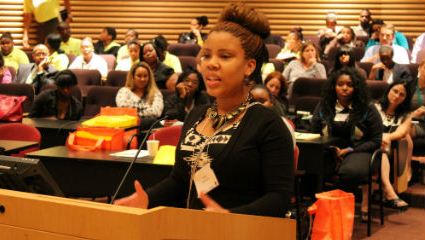
Youth aging out of Michigan’s foster care system gathered on Wayne State’s campus last week to give raw, emotional testimony to state policymakers eager to hear suggestions for reform.
While generally praising Michigan’s extension of financial benefits and support services to foster youth until age 21, the participants said more training and education are needed to make caseworkers aware of the various assistance options that exist to help them further their education and secure stable living arrangements, employment and transportation. They also pointed out that many benefit programs don’t reflect the real-world circumstances or needs of foster youth. Michigan’s Education and Training Voucher, they noted, provides college tuition assistance until age 23 when, in reality, many foster youth experience so many disruptions to their education that they are not ready to begin college until their early twenties. Given the cognitive, behavioral and educational challenges that routinely face this vulnerable population, the speakers recommended extending foster care benefits until age 23 or later.
The youth spoke at a KidSpeak® listening panel held on Aug. 12 in the WSU Law School’s Spencer M. Partrich Auditorium. The panel was cosponsored by Wayne Law, the School of Social Work, Voices for Michigan’s Children and Foster Care Alumni of America – Michigan Chapter. Taking turns at the microphone, foster youth told state legislators, state department heads, academics and nonprofit leaders about the difficulties they experienced due to unstable placements, separation from siblings, and the abrupt, unforecasted termination of benefits that left many struggling to find food and shelter. But many also expressed gratitude for footholds they gained along the way, such as a helpful mentor, a loving foster parent, or an academic or sports scholarship.
Policymakers attending KidSpeak® included Michigan Department of Human Services (DHS) Director Maura Corrigan and Michigan House of Representatives members Dian Slavens, Jon Switalski, Adam Zemke and Rashida Tlaib, who was named 2012 Citizen of the Year by the School of Social Work for her efforts to promote economic and social justice in her district. Panel member Alice Thompson, CEO of Black Family Development and chair of the School of Social Work Board of Visitors, introduced the KidSpeak® session with the observation that throughout history “we have seen social innovation because the voice of youth rises up to create change.”
Wayne State is one of several Michigan universities considered foster youth-friendly, due largely to its Transition to Independence Program (TIP). Funded through a contract from the DHS and administered by the School of Social Work, TIP partners with Metro Detroit-area organizations to provide Wayne State students aging out of the foster care system with a range of free support, including professional mentoring, legal representation, financial literacy training and counseling.
For more information on TIP, contact Angelique Day, assistant professor and project director at 313-577-4407 or angelique.day@wayne.edu.
